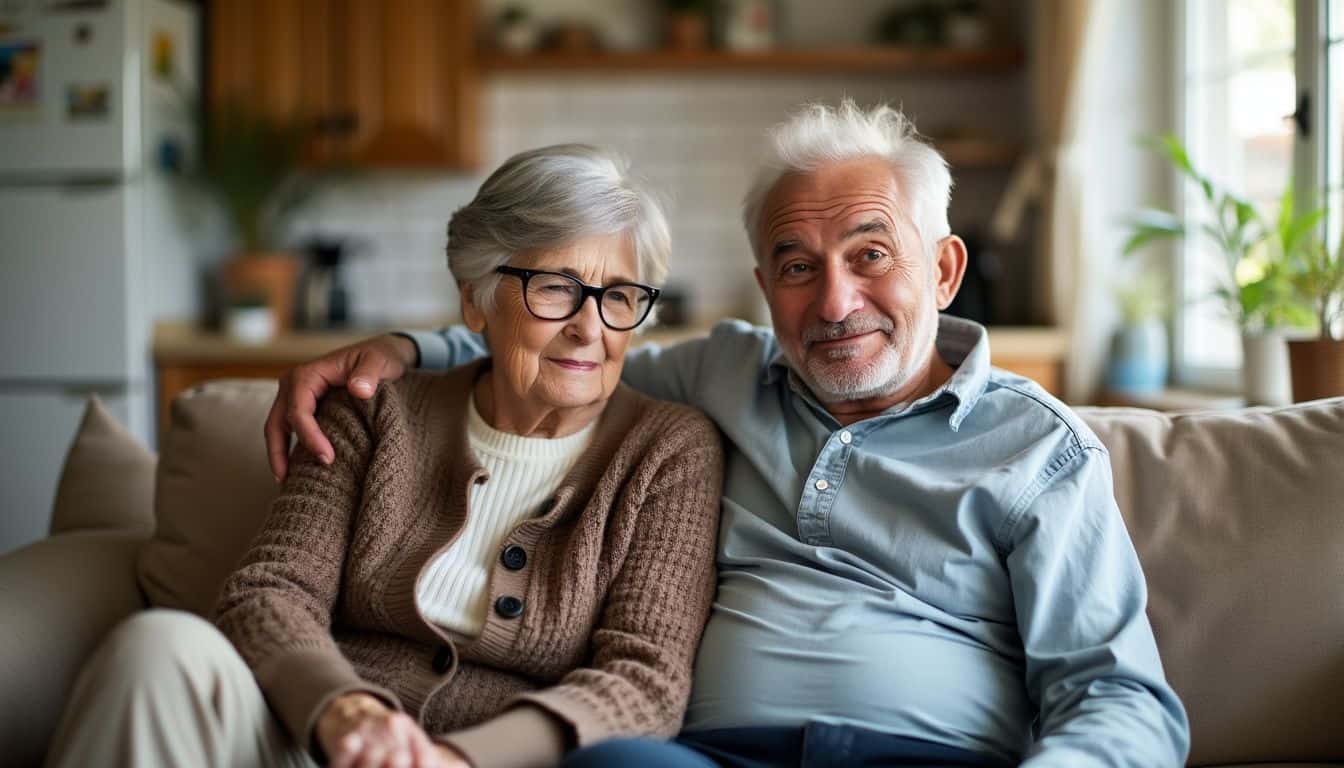Keeping our older loved ones safe at home can be a real head-scratcher. Did you know that falls are the leading cause of injuries for seniors? Yikes! 3 But don’t worry – we’ve got your back.
We’re dishing out seven clever tricks to make those golden years shine bright and worry-free. Ready to turn your folks’ home into a safety haven? 2 1
Key Takeaways
Falls are the leading cause of injuries for seniors, but safety measures like grab bars, non-slip mats, and clear pathways can greatly reduce risks.
Home security systems and medical alert devices provide 24/7 protection and peace of mind for older adults living alone, with costs ranging from $20-$45 monthly.
Seniors face 2.5 times higher risk of dying in fires compared to younger people, making smoke alarms and fire safety protocols critical.
Regular home safety assessments are essential to identify and address hazards. Professionals like occupational therapists can provide tailored advice.
Financial support through grants and Medicare may be available to help cover costs of home safety modifications for low-income seniors.
Table of Contents
Key Home Safety Tips for the Elderly
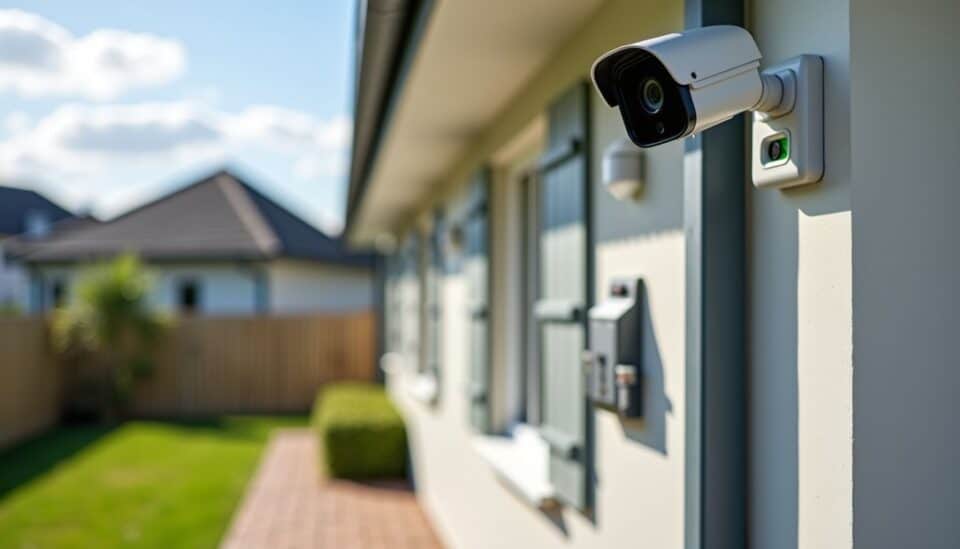
Hey there, golden gals! Let’s chat about keeping your home safe as you rock those silver strands. It’s all about smart moves – like having emergency numbers on speed dial and setting up a security system that’s got your back 24/7.
These little tweaks can make a world of difference… trust me!
Access emergency contact information easily
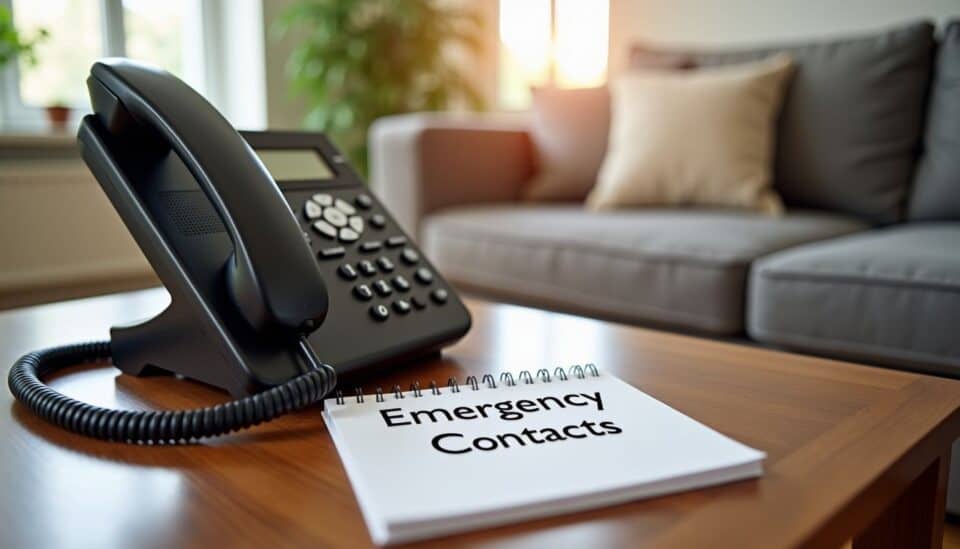
Let’s talk about keeping those important numbers handy. It’s smart to put emergency contacts near every phone in big, bold letters. We’re talking 911, Poison Control (1-800-222-1222), your doctor’s office, and a trusted family member or friend.
Don’t forget to set up a phone tree too – it’s like a calling chain for emergencies. 1
Safety isn’t expensive, it’s priceless.
Home security is another biggie. Beefing up your system can give you peace of mind. Think about adding features like motion sensors or cameras. These gadgets can be real lifesavers, especially if you live alone or have health concerns.
They’re not just for burglars – they can alert loved ones if something seems off. 2
Set up home security systems
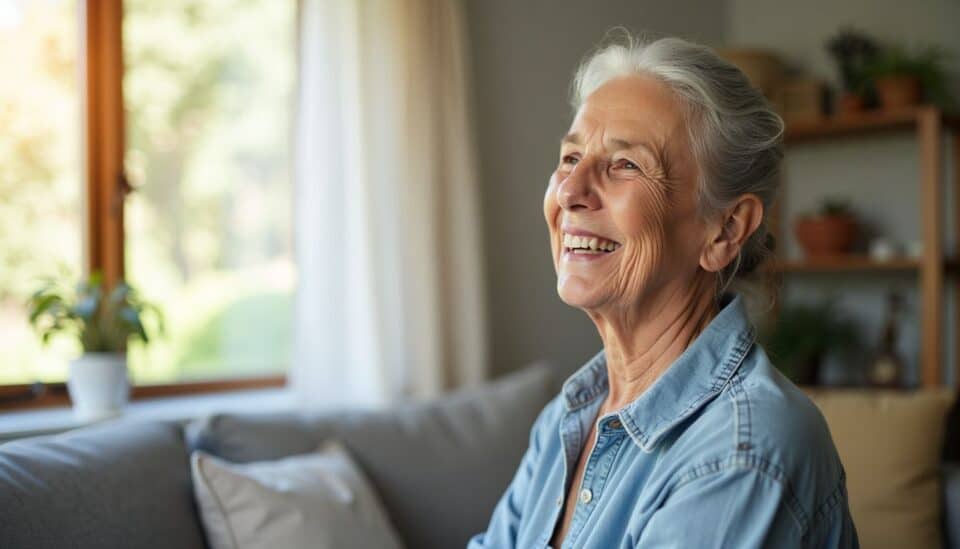
Home security systems are a game-changer for older folks. They’re not just fancy gadgets – they really help keep seniors safe. These systems can scare off burglars and call for help fast if needed.
That’s huge, since property crimes are a real worry for many older adults. 2
My aunt got her system installed, and she felt so much better knowing she had that extra layer of protection. It’s not just about break-ins either. Many systems now come with fire and carbon monoxide alarms too.
That’s critical because seniors face a higher risk in fires. In fact, they’re over twice as likely to die in a blaze compared to younger people. Pretty scary stuff! But a good security setup can give real peace of mind. 3 Next up, let’s chat about another tech tool that’s a lifesaver for seniors….
Implement medical alert systems
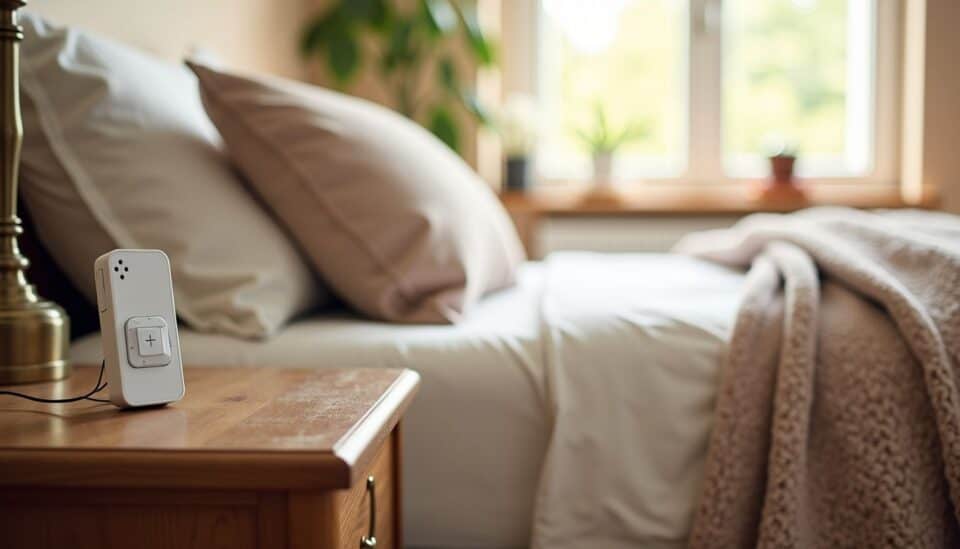
Medical alert systems are a game-changer for older folks. They’re like having a guardian angel on speed dial! These nifty gadgets cost about $20 to $45 a month, with fall detection adding another $10. 4 That’s a small price for peace of mind, right? Plus, 60% of users love the automatic fall detection feature. 4 It’s like having a safety net that’s always there.
I’ve seen firsthand how these systems can be lifesavers. My aunt Mary uses one, and it’s given our family such relief. These gizmos offer GPS tracking and two-way chat, so help is just a button-press away.
Whether it’s a tumble in the tub or feeling under the weather, these systems make sure no one’s left high and dry in an emergency. It’s not just about safety – it’s about living life to the fullest without worry. 5
Strategies to Prevent Falls
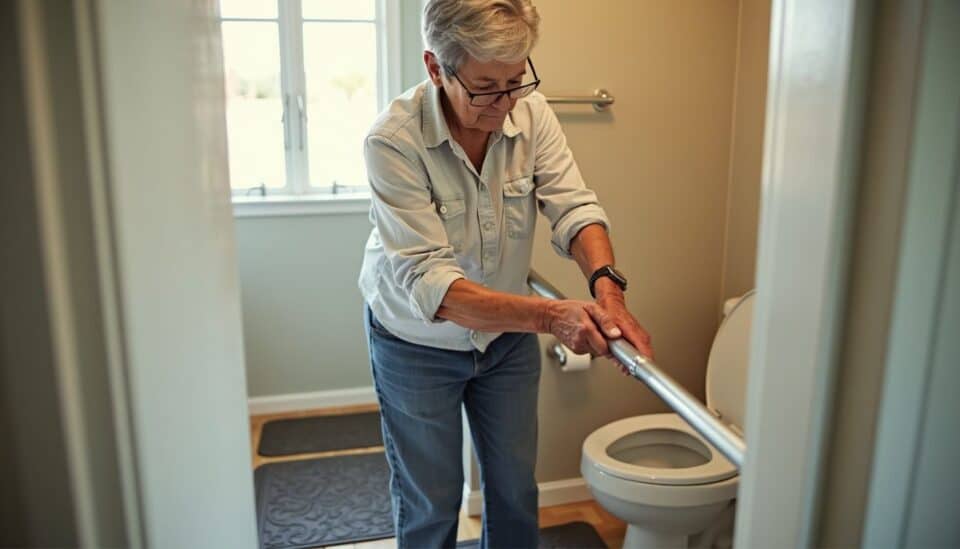
Falls can be a real pain – literally! Let’s chat about some smart moves to keep you steady on your feet. From grab bars to non-slip mats, there are a bunch of nifty tricks to make your home safer.
Evaluate the home for tripping risks
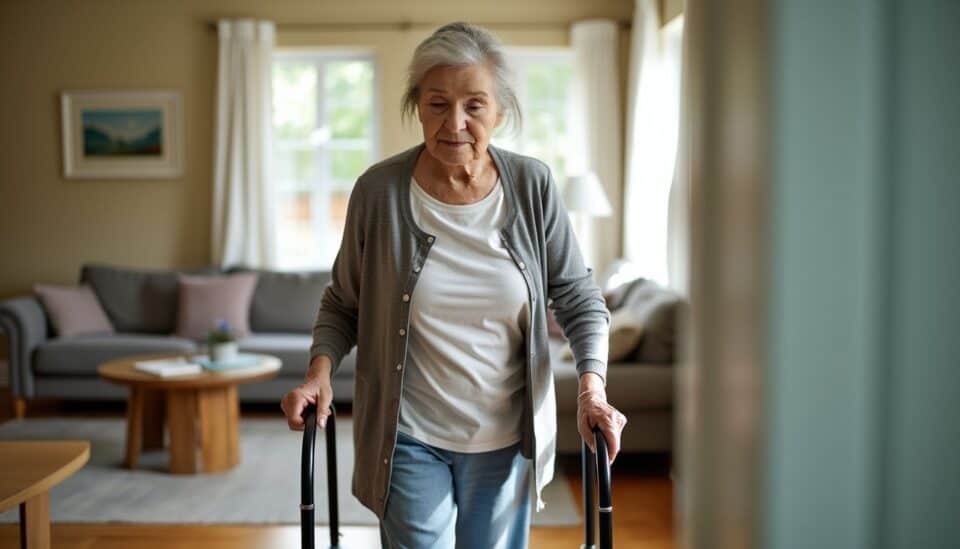
Tripping hazards are everywhere in our homes. Let’s tackle these hidden dangers and make our golden years safer!
- Clear the clutter: Get rid of or organize loose items on floors. Books, shoes, and decorations can cause nasty falls.
- Secure those rugs: Use non-slip mats or double-sided tape to keep area rugs in place. No more sliding surprises!
- Light it up: Put in bright bulbs and add night lights in hallways and bathrooms. Good lighting helps spot potential hazards. 7
- Fix uneven surfaces: Repair loose floorboards or tiles. Even small bumps can lead to big falls.
- Rearrange furniture: Make wide, clear paths through rooms. This gives plenty of space to move around safely.
- Tame those cords: Hide electrical cords along walls or under furniture. Loose wires can cause accidents.
- Add grab bars: Put these handy helpers in bathrooms and along staircases. They’re great for extra support when needed. 6
- Think about a folding wheelchair from Marc’s Mobility: These can help in tricky areas or when you’re feeling less steady.
Secure stairways and walkways
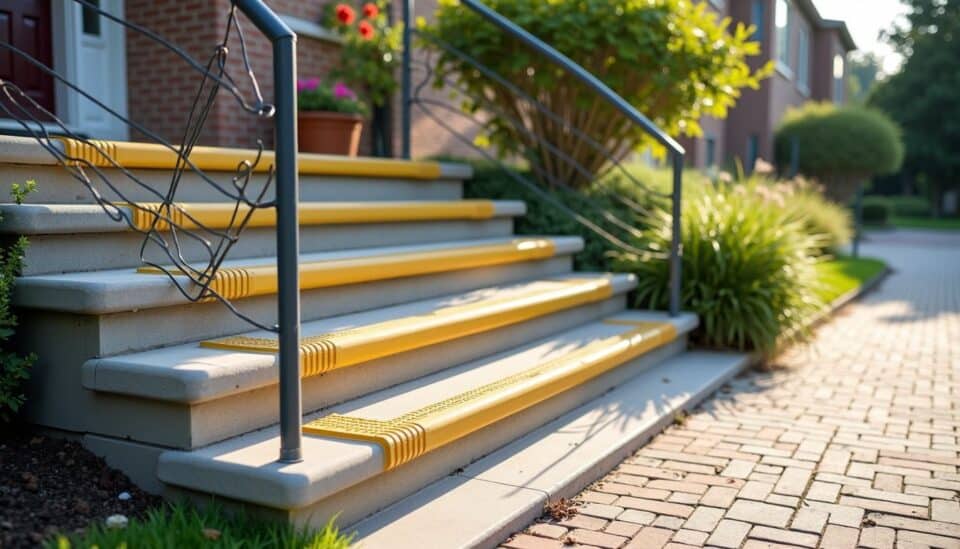
Stairways and walkways can be danger zones for older folks. Let’s make them safer with some smart moves.
- Install handrails on both sides of stairs. Grab bars give extra support when going up or down.7
- Light it up! Add bright bulbs and nightlights to see steps clearly. No more stumbling in the dark.
- Get rid of loose rugs or carpets near stairs. They’re trip hazards waiting to happen.
- Fix uneven or broken steps right away. One wobbly step could lead to a nasty fall.
- Mark the edges of steps with bright tape. It helps see where each step starts and ends.
- Keep stairs and walkways clutter-free. No more piles of stuff to dodge around.
- Add non-slip treads to wooden or slippery steps. They give feet better grip, rain or shine.
- For outdoor steps, install covers to keep snow and ice away. Winter won’t be so scary anymore.6
Consider safety in bedrooms and living areas
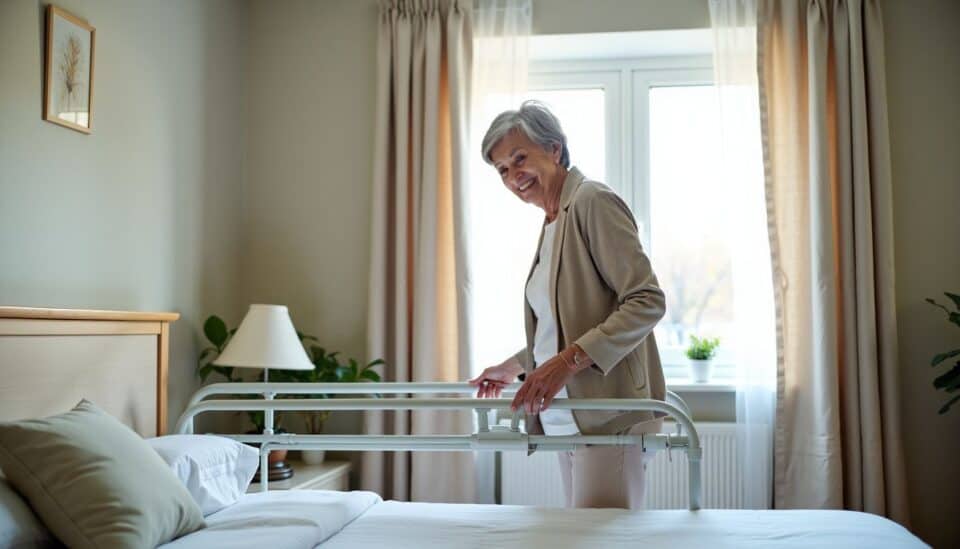
Bedrooms and living areas should be havens of comfort and safety. Let’s dive into some smart ways to make these spaces extra secure for our golden gals.
- Clear the clutter: Toss out those unnecessary throw rugs and move furniture to create wide, open paths. This cuts down on tripping hazards big time. 6
- Light it up: Install bright, easy-to-reach lamps near beds and seating areas. Motion-sensor night lights are great for those midnight bathroom trips. 7
- Bed basics: Lower the bed height if needed. Add a sturdy bed rail to help with getting in and out safely.
- Cozy seating: Choose chairs with firm cushions and sturdy armrests. They’re easier to get up from and provide extra support.
- Tech-savvy safety: Place phones or medical alert devices within arm’s reach of beds and favorite chairs. Quick access can be a real lifesaver.
- Smooth moves: Swap out shag carpets for low-pile options or non-slip flooring. It’s easier on walkers and reduces fall risks.
- Grab and go: Install grab bars near beds and in living areas. They offer extra stability when standing up or moving around.
Now, let’s chat about keeping the kitchen and bathroom safe and sound.
Ensuring Safety in the Kitchen and Bathroom
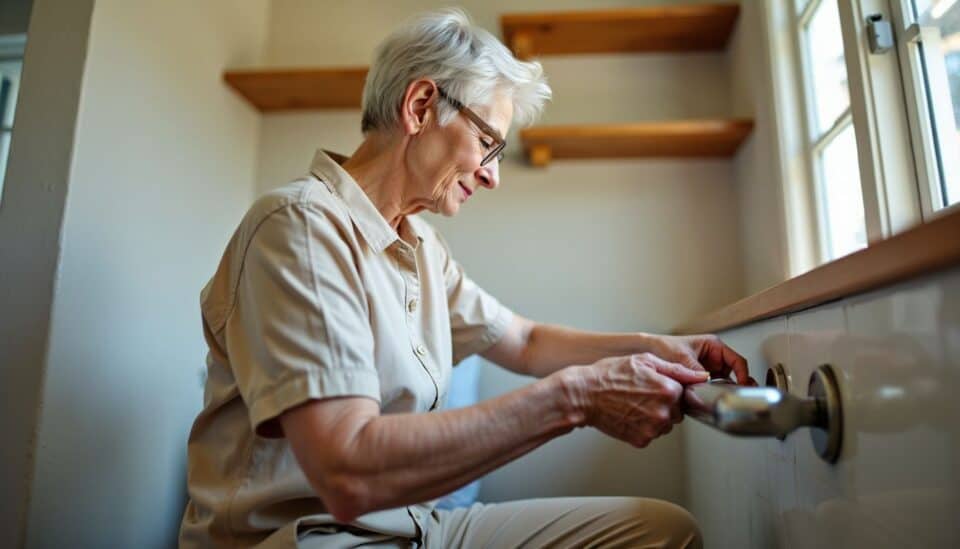
Kitchens and bathrooms can be danger zones for older folks. Hot stoves, slippery floors, sharp knives… yikes! But don’t worry – we’ve got some nifty tricks up our sleeves to make these spaces safer.
Want to know how to turn your kitchen and bathroom into senior-friendly havens? Keep reading!
Reduce bathroom dangers
Let’s talk bathroom safety, ladies! We all know this slippery space can be a real danger zone. Here’s how to make your bathroom a safer place:
- Grab bars are your new best friends. Pop these sturdy helpers near the toilet and in the shower. They’ll give you something to hold onto when things get wobbly.
- Slip-proof your tub. Rubber mats are a game-changer. They grip the tub floor, keeping you steady on your feet. 1
- Consider a shower makeover. A tub chair or bench can be a real lifesaver. It lets you sit while you soap up, cutting fall risks big time.
- Raise that throne. A raised toilet seat makes sitting and standing easier on your knees and back.
- Keep things toasty, not scalding. Set your water heater to 120°F max. It’ll prevent nasty burns while you’re washing up.
- Light it up. Bright lighting helps you see clearly, avoiding trips and slips. Try LED bulbs for extra brightness.
- Clear the clutter. Keep floors free of rugs or items that could trip you up. A clear path is a safe path!
- Non-slip strips are your pals. Stick these on your tub or shower floor for extra grip. They’re cheap and super effective. 8
Promote kitchen safety against fires and burns
The kitchen can be a danger zone for our golden-aged loved ones. Let’s whip up some safety measures to keep those fires and burns at bay:
- Clear the clutter: Keep counters tidy and free from flammable items. A clean workspace is a safe workspace! 9
- Dress for success: Avoid loose, flowing clothes while cooking. They’re a recipe for disaster near open flames.
- Keep it cool: Turn pot handles inward on the stove. This simple trick prevents accidental spills and nasty burns.
- Stay alert: Never leave cooking food unattended. If you need to step away, turn off the stove first.
- Zap safely: Use oven mitts when handling hot dishes from the microwave. Those sneaky steam burns are no joke!
- Replace faulty cords: Swap out appliances with damaged cords ASAP. Frayed wires are fire hazards waiting to happen. 10
- Fire extinguisher at the ready: Keep one within easy reach. It’s your kitchen’s superhero in case of emergencies.
- Smoke detector check: Test it monthly and replace batteries twice a year. It’s your first line of defense against kitchen fires.
Now that we’ve covered kitchen safety, let’s move on to tackling common hazards throughout the home.
Addressing Common Hazards
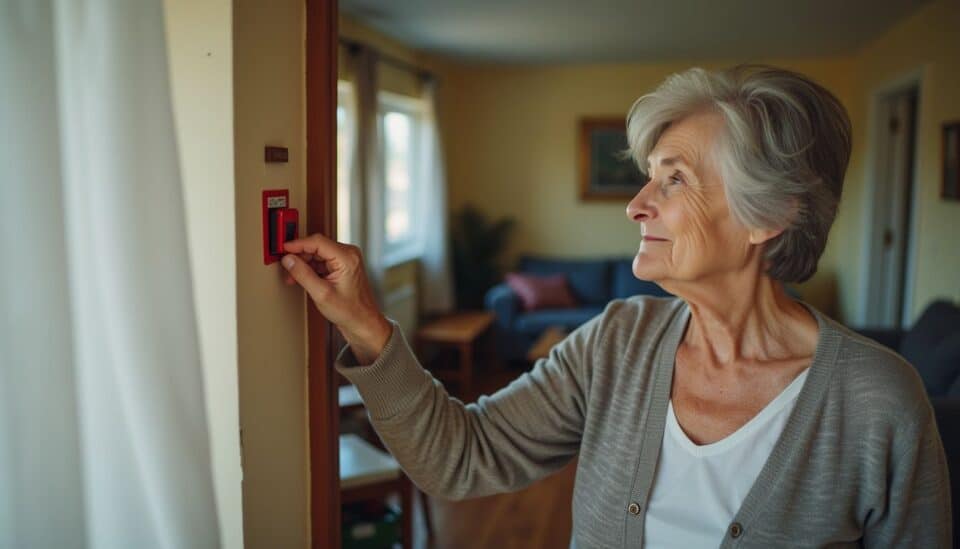
Let’s talk about staying safe at home. There’s more to it than just locking doors! Fire alarms, electrical checks, and smart pill boxes… they’re all part of the game. Wanna know more? Keep reading!
Adopt fire safety protocols
Fire safety is a big deal for older folks. In 2020, seniors were 2.5 times more likely to die in fires than other age groups. 11 That’s scary! But don’t worry – there are easy ways to stay safe.
First, make sure you have working smoke alarms. If you’re hard of hearing, get ones with special sounds or lights. Ask a friend or family member to check them regularly if you can’t.
An ounce of prevention is worth a pound of cure.
Fire safety isn’t just about alarms, though. Keep a fire extinguisher handy and know how to use it. Clear clutter from exits and practice your escape plan. And hey, why not watch some fire safety videos made just for seniors? They’re full of great tips and might even make you chuckle.
Stay safe out there, ladies! 12
Follow electrical safety guidelines
Now that we’ve covered fire safety, let’s chat about another important topic – electrical safety. It’s surprising how many accidents happen because of faulty wiring or careless use of electrical gadgets.
Did you know that electrical issues are a leading cause of home fires every year? 13 Wow! And here’s something to think about – our older friends (65+) are at higher risk in these dangerous situations. 5
So, ladies, let’s get practical. Keep those cords out from under your cozy blankets – it’s not safe! And for electric blankets, only use ones approved by testing labs. I learned this firsthand after a close call with my grandma’s old electric blanket.
It’s just not worth the risk! Safety comes first – even if it means giving up a little comfort. Your later years should be cozy, but not because of risky wiring!
Manage medication safely
Meds can be tricky, but they don’t have to be a headache! Keep your pills in their original bottles – it’s like giving each one its own little home. Ask your pharmacist for labels with big, easy-to-read print.
It’s like getting a magnifying glass for free! Take your meds in a bright spot… no squinting allowed. And don’t forget to bring all your meds to doctor visits. It’s like show-and-tell, but for grown-ups! 14
I learned this the hard way. Once, I mixed up my morning and night pills – talk about a wild day! Now, I use a pill organizer with big compartments. It’s a game-changer. I also keep a list of my meds on my phone.
It’s handy when I’m at the doctor’s or if there’s an emergency. Safety first, right? With these simple tricks, managing meds becomes a breeze. Your golden years should sparkle, not stress you out! 15
Leveraging Technology for Safer Living Spaces
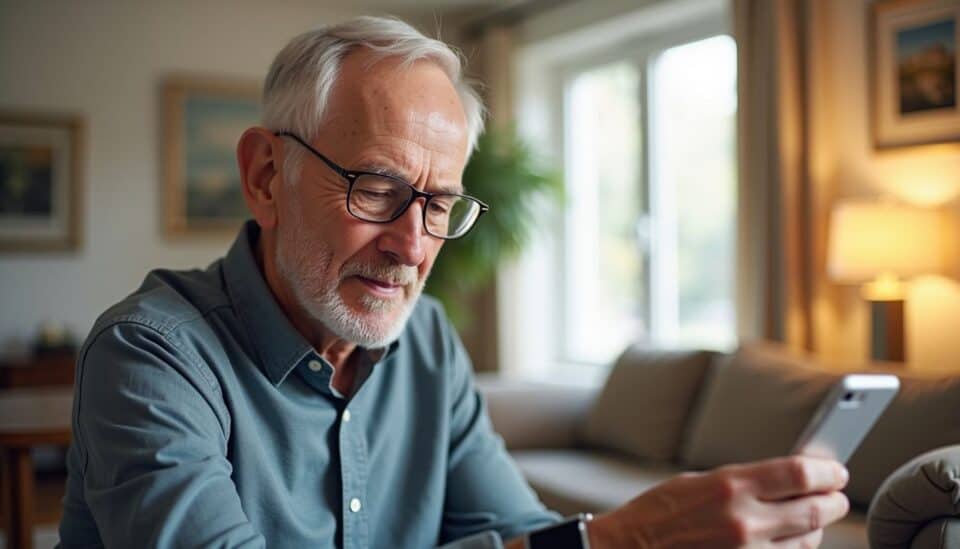
Tech’s not just for the young! It’s a game-changer for older folks too. Smart gadgets can make life safer and easier – think voice-controlled lights or fall-detecting smartwatches.
Utilize GPS trackers for oversight
GPS trackers are a game-changer for keeping an eye on our golden-agers. These nifty gadgets let us know where Mom or Grandpa is at all times. They’re like a guardian angel in your pocket! With real-time tracking, we can breathe easy knowing our loved ones are safe. 16 Plus, if they wander off, we’ll get an alert faster than you can say “Where’s Grandma?” 16
But wait, there’s more! These trackers aren’t just for peace of mind. They give our seniors more freedom to roam. No more worrying about Dad getting lost on his daily walk. And if there’s an emergency? One push of a button, and help’s on the way.
It’s like having a personal superhero on speed dial. 17 Next up, let’s chat about how hearing aids can make life safer and more enjoyable for our loved ones.
Use hearing aids for better awareness
Moving from GPS trackers, let’s talk about another tech tool that’s a game-changer for safety: hearing aids. These small devices are incredibly important for keeping you safe and sound.
Hearing aids aren’t just for chatting with friends. They’re your key tool against accidents. They help you catch important warning sounds – like smoke alarms or car horns. Plus, they make it easier to hear what’s going on around you.
Did you know people with even mild hearing loss are almost three times more likely to fall? Wow! But use those hearing aids, and you’ll be much more stable. 18 They’re also very useful in emergencies.
You’ll hear instructions clearly and stay informed. 19 So, if you’re having trouble hearing, don’t wait. Get your ears checked and think about hearing aids. Your safety (and your loved ones’ peace of mind) is worth it!
Regular home safety assessments and updates
Home safety checks aren’t just a one-and-done deal. They’re like your yearly teeth cleaning – you gotta keep at it! The Joint Commission and WHO say regular safety checks are a must. 20 It’s not just about spotting loose rugs or wonky stairs. You’ve got to look at the whole picture – from your meds to your gadgets. 21
I learned this the hard way when my mom slipped in her bathroom. We thought we’d covered all the bases, but we missed a crucial update on her grab bars. Now, we do a full sweep every few months.
We check her medical alert system, tweak her living spaces, and even update her tech. It’s a bit of work, sure. But it’s worth it to keep her safe and sound in her golden years. Plus, it gives us both peace of mind…
and that’s priceless!
Financial and Professional Resources
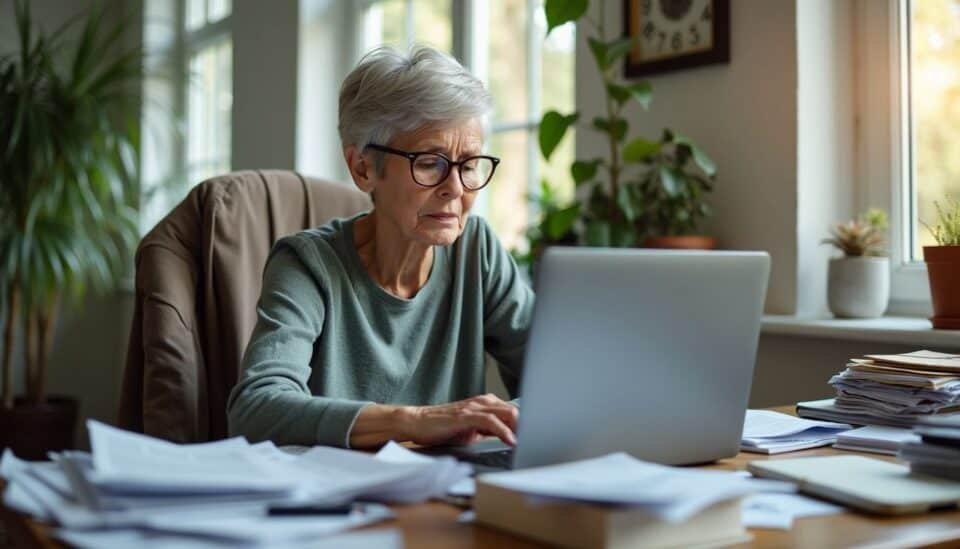
Money plays a role in home safety improvements. But don’t worry – help is available! Grants and expert guidance can make your later years more secure.
Secure financial support for home modifications
Getting money for home fixes doesn’t have to be a headache. Lots of folks don’t know there are grants out there – free cash you don’t pay back! These one-time funds can help make your place safer. 1 I once helped my aunt apply for one. She got $5,000 to put in grab bars and a walk-in shower. It was a game-changer!
But grants aren’t the only way to go. If you need assisted living, Medicare might chip in for some gadgets.
They won’t pay for big changes, but every bit helps. 1 There’s also training for folks who want to learn how to make homes safer. And some cities even offer public money for these projects. 22 It’s all about keeping us independent as we age – and that’s priceless!
Engage professionals for safety advice
Safety pros can be your best pals in making your home a cozy fortress. Occupational therapists, physical therapists, and aging-in-place experts know their stuff. They’ll walk through your place, spot trouble areas, and cook up a plan just for you.
It’s like having a personal safety detective! 23
These pros aren’t just about slapping grab bars everywhere. They’ll look at the big picture – from your daily routines to any health issues you might have. They’ll suggest smart tweaks that’ll keep you safe without turning your home into a hospital.
Plus, they’re up-to-date on the latest gadgets and gizmos that can make life easier… and safer! 5
People Also Ask
How can I make my home safer for aging in place?
Start with the basics. Install grab bars in bathrooms and stairwells. Use non-slip bath mats and a shower chair. Replace old doorknobs with lever handles. Don’t forget smoke and carbon monoxide detectors on every floor. These small changes can make a big difference.
What’s the deal with medication management for seniors?
It’s a biggie! Keep all meds in one spot. Use a pill organizer. Set alarms for dosage times. Be careful with sleep aids and over-the-counter drugs. Talk to your doc or pharmacist about possible interactions. Good medication management can be a real lifesaver.
How important is fall prevention for older adults?
Falls are no joke for seniors. They’re like banana peels in a cartoon – except not funny. Remove tripping hazards like loose rugs or extension cords. Add handrails on both sides of stairs. Consider a stair lift if needed. Good lighting is key, especially in hallways and on steps. Remember, an ounce of prevention is worth a pound of cure!
What should I know about fire safety for the elderly?
Fire safety is hot stuff! Have working smoke detectors and fire extinguishers on each floor. Create an evacuation plan and practice fire drills. If possible, install a sprinkler system. For those with mobility issues, consider a bedroom on the ground floor. Better safe than sorry!
How can technology help keep seniors safe at home?
Tech can be a real game-changer! Look into personal emergency response systems – they’re like having a guardian angel on speed dial. Smart home devices can control lights and thermostats. Wearable tech can monitor health and alert caregivers if something’s off. It’s not about replacing human care, but enhancing it.
What about everyday safety in the kitchen and bathroom?
These rooms can be danger zones. In the kitchen, use a cutting board with spikes to hold food in place. Get utensils with big handles. In the bathroom, set the hot water heater to a safe temp to prevent burns. A walk-in tub can be a godsend. Remember, safety first, but independence is the goal!
References
^ https://www.ncoa.org/adviser/sleep/home-safety-older-adults/ (2024-07-10)
^ https://staysafe.org/home-safety/home-security-for-aging-in-place/
^ https://www.adt.com/resources/safety-tips-for-the-elderly?srsltid=AfmBOooZBUg_4efCERStfQdAytTkT06nWsDVnFfUb830Szh827cJsdiz
^ https://www.ncoa.org/adviser/medical-alert-systems/best-medical-alert-systems/ (2024-08-15)
^ https://www.nia.nih.gov/health/aging-place/home-safety-tips-older-adults (2024-07-12)
^ https://www.ncbi.nlm.nih.gov/pmc/articles/PMC8246567/
^ https://www.nia.nih.gov/health/falls-and-falls-prevention/preventing-falls-home-room-room (2022-09-12)
^ https://www.ncbi.nlm.nih.gov/pmc/articles/PMC10028600/
^ https://www.edenseniorhc.com/fire-and-kitchen-safety-tips-for-seniors/
^ https://www.mass.gov/info-details/fire-and-burn-safety-for-older-adults
^ https://www.usfa.fema.gov/prevention/home-fires/at-risk-audiences/older-adults/
^ https://www.obfd3.com/senior-safety-tips-enhance-fire-protection (2024-07-23)
^ https://www.esfi.org/home-electrical-safety-tips-for-older-adults-public-service-announcement-psa/
^ https://www.ncbi.nlm.nih.gov/pmc/articles/PMC9230543/
^ https://www.ncbi.nlm.nih.gov/books/NBK585602/
^ https://tracki.com/blogs/post/benefits-of-gps-trackers-for-senior-care?srsltid=AfmBOopFwgk7qLknhuG9FS7gOKvZOyy6VSJa2FP4dOBmEVmnQgbdeA7C (2024-06-13)
^ https://www.ncbi.nlm.nih.gov/pmc/articles/PMC8546532/
^ https://www.entconsultants.net/using-hearing-aids-to-improve-safety/
^ https://www.ncbi.nlm.nih.gov/pmc/articles/PMC4925253/
^ https://www.ncbi.nlm.nih.gov/pmc/articles/PMC8186682/
^ https://www.ncbi.nlm.nih.gov/pmc/articles/PMC7992959/
^ https://www.ncbi.nlm.nih.gov/pmc/articles/PMC8165872/
^ https://www.liveatthebirches.com/tips-for-staying-safe-and-independent-as-a-senior-home-safety-and-mobility-tips (2024-04-17)
